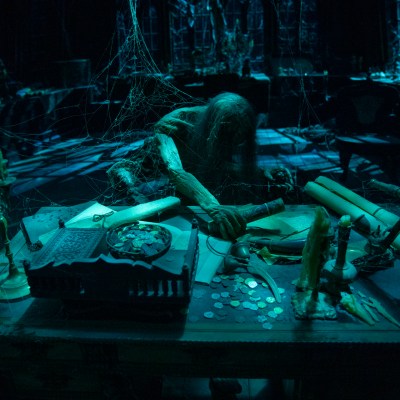Lovecraft Country Episode 6 Review: Meet Me In Daegu
Lovecraft Country introduces us to the mystery woman in Tic’s past and some fascinating Korean magic.

This Lovecraft Country review contains spoilers.
Lovecraft Country Episode 6
Lovecraft Country tells us magic exists, then shows us the ways it touches the lives of the characters we spend time with every week. But magic isn’t just theirs, and it doesn’t just affect them. “Meet Me in Daegu” is a fascinating exploration of the many ways magic manifests throughout the world. It expands the show’s lore by showing us one of the many forms magic can take, and is a welcome detour from the linear storytelling we’ve had so far.
This episode takes us to Daegu, South Korea in 1949, at the start of the Korean War. It follows Ji-ah, Tic’s ex-lover and the source of the cryptic warnings for him to not go home. Ji-ah is a Kumiho —similar to a Japanese Kitsune— a nine-tailed fox spirit that can be summoned in the form of a beautiful woman to avenge the wrong done by men. Ji-ah was sexually abused by her stepfather, and the Kumiho was summoned by Soon Hee (Cindy Chang), Ji-ah’s mother, to empower her to protect herself and take revenge. In order to become human again, Ji-ah has to take the souls of a hundred men.
We meet Ji-ah for the first time in Tic’s dream, as the red woman, then again as an enemy combatant in Ardham Lodge. Both of those are manifestations of Tic’s subconscious, and they tell us that she is important to him, but not how. Tic doesn’t know the real her, not fully, and up till now, she has been a bogeyman, a shadow he’s carried with him since his time in South Korea. When they first meet, Ji-ah plans to make Tic her final victim. She wants to avenge the death of her best friend Young-Ja (Prisca Kim), who is presumably interrogated then killed by American soldiers, of which Atticus is one. But they bond over a shared love of fiction and fall in love. Ji-ah escapes into film like Tic escapes into books, and escape is what they see in each other. Escape from their pasts and the monsters they’ve become.
This episode examines what it means to be a monster. Ji-ah takes men’s souls, but she doesn’t relish the killing. The violence she enacts is the cost for being in this world, a price she pays, even if she didn’t ask to be here. Tic volunteered for the military, to escape from the violence of his upbringing. But in doing so, he made himself an instrument of violence. Both of these people are capable of monstrous things, but in being with one another, they prove they are capable of love, too. This episode is also about the lengths parents will go to to protect their children. Soon Hee summons the Kumiho out of a desire to protect her daughter. Similar to Montrose, who does everything he feels is necessary to protect Tic. Both parents are operating from a place of love, but it is a love soured by trauma, guilt, and fear.
I am not qualified to say whether this is a positive depiction of Korean culture, or an acceptable take on this specific Korean lore. But I appreciate that the first 26 minutes is entirely in Korean, and that Ji-ah is the central figure of the story, even as Tic becomes more present in it. She is important to the narrative because of her relationship to Tic, but we are allowed to get to know her, independent of him. It is that kind of focus on character that keeps us invested in this story, even as the circumstances get more dire and more bizarre.
And bizarre is par for the course. When Ji-ah brings a man home for the first time in the episode, they have sex, and hairy, tentacle-like tails emerge from all of her orifices to skewer him. She sees his entire life flash before her, then he dissolves into a puddle of blood. That is her power. When she brings Tic home for the first time, she plans to do the same to him. But her feelings for him give her pause, and she runs him off. “You murdered my best friend and you saved me, I think…” is how she later explains herself to Tic. When they do have sex, his first time, she makes a specific point to control herself. This proves to her that she can choose not to be a monster.
When Ji-ah and Tic have sex again, she loses control of her tails, and she begins to absorb Tic. She manages to stop herself from killing him, but sees his entire life and his death—not by her hands, and tries to warn him. Lovecraft Country loves a tentacle, and Ji-ah’s Kumiho tails truly exemplify this. The tails emerge from her groin, her eyes, ears, and finally her mouth, transforming someone beautiful into something grotesque. This is Tic’s first experience with magic, and it’s mired in fear. Had he not run, had he really listened to the story of the Kumiho, had he headed her warning to not go home, had he believed in her… Tic’s rejection of Ji-ah is a defining moment in his life and his journey into the magical world.
Each episode of Lovecraft Country packs in so much information, that it is sometimes difficult to grasp everything, which is both wonderful and frustrating. You are rewarded by revisiting episodes with new information or better context, which keeps the show dynamic. “Meet Me in Daegu” is a refreshingly straightforward story that succeeds in expanding the show’s lore and providing a deeper understanding of who Tic is. We’ve seen a copy of The Count of Monte Cristo by Alexandre Dumas several times now, and this episode gives us context to the books’ meaning for Tic and Montrose, in particular, and its parallels to their story within this show.
In my review of last week’s episode, I expressed hope that Ji-ah’s “formal introduction to the story broadens the magical world even further,” and this episode satisfies. Lovecraft Country has crafted an intriguing story with more hits than misses, and my expectations remain high that the season can deliver on all of its promise.

